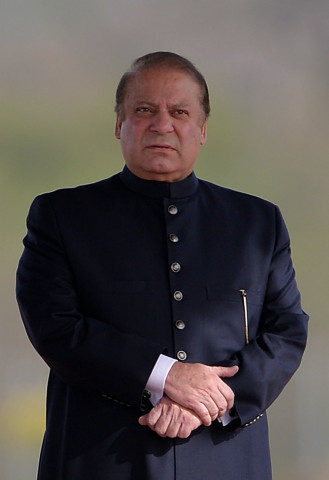Pakistan on the path of progress, says PM Nawaz
Blames poor agri-output for missing annual growth rate target

Prime Minister Nawaz Sharif. PHOTO: AFP
The premier expressed these views in a brief chat with the media after chairing the National Economic Council and Cabinet meetings through video-link from the Pakistani High Commission in London.
He said below-average agriculture in the outgoing fiscal year 2015-16 had restricted economic growth at around 4.7%, which otherwise could have touched 5.7%. “Poor cotton crop and low commodity prices in the international market contributed to the low agricultural performance in Pakistan, which caused one percent less growth of economy,” he believed.
The premier also asked the finance minister to announce a special package for farmers and offer a substantial subsidy on urea in the upcoming budget.

To a question on chairing the budget-related meetings, PM Nawaz said he was not out of country on his “own will”. “In the prevailing circumstances, video conference was the best possible way and it should be acceptable to all,” he said.
When asked if the secrecy of budget proposals could be ensured via video-link, he said the budget proposals were not anything secret. “These proposals often become the headlines of newspapers one day before they are presented in parliament. This is common in Pakistan,” he added on a lighter note.
The PM also thanked the nation for its prayers and good wishes for him, saying his all energy was dedicated for the soil of Pakistan.He said he dreamed of a Pakistan that is free of poverty, backwardness and illiteracy.
Earlier while presiding over the Islamabad meetings, PM Nawaz said the effective economic policies of the PML-N government were bearing fruit. “All economic indicators are showing positive trends. Growth rate is at an eight-year high. Inflation has come down below three percent. Fiscal deficit is below 4.3 percent. Tax receipts have shown an exemplary surge of 56% as compared to 2013,” he said while addressing the federal cabinet, which considered and approved the budget and taxation proposals for the fiscal 2016-17.
The premier said foreign exchange reserves had increased from $ 7.8 billion in February2014 to US$ 21.6 billion today. He added the government’s comprehensive policies had brought the country out of its fragile and instable economy with a high fiscal deficit, low investment and an energy crisis that had destroyed the industrial sector.
Published in The Express Tribune, May 31st, 2016.



















COMMENTS
Comments are moderated and generally will be posted if they are on-topic and not abusive.
For more information, please see our Comments FAQ